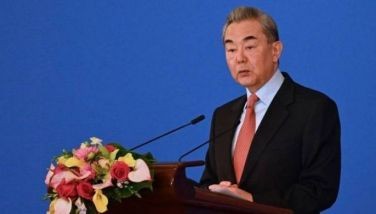Syrian refugees seek new passports as a ticket to Europe
AMMAN — A months-old Syrian government decision to start issuing passports to Syrians who fled their war-ravaged country is quietly contributing to the large exodus of refugees to Europe.
With new passports in hand, Syrians who fled to neighboring countries such as Jordan can now fly to Turkey legally and from there, start the dangerous trek to Europe with the help of smugglers.
Hundreds line up at the Syrian embassy in Jordan every day, many hoping a new passport is a ticket to a better future.
A new travel document costs $400, and some have sold their wives' gold dowry or gone deeper into debt to pay the fee, double what most make a month with off-the-books odd jobs.
"The minute I get the passport, I will fly to Turkey," said house painter Ali Mohammed, 33, one of those waiting in line this week.
Mohammed, who fled Syria in 2012, said his final destination is Germany, where relatives have already received asylum.
Cuts in international aid have made the refugees' survival even tougher in Mideast host countries. There is also a sense of urgency among the refugees, after several European countries re-imposed border checks in recent days to stem the flow of migrants.
Refugees preparing for the journey said they are willing to gamble. They believe there is no future for them in overburdened Jordan, where they can't work legally or provide for their families.
Syria announced the new rules in April, saying it would start issuing passports to those who had left the country illegally by sidestepping official border crossings.
The pro-government daily al-Watan said at the time that this would facilitate the movement of hundreds of thousands of refugees without passports.
Ayman Alloush, the top Syrian diplomat in Jordan, said Tuesday that the goal is to help Syrians.
He dismissed any suggestion that his government is encouraging the exodus to Europe, saying that question should be addressed to Jordan and Turkey instead. He said Turkey is turning "a blind eye" to those smuggling refugees.
Jordanian government spokesman Mohammed Momani said as long as Syrian refugees have the required documents, it is their decision to leave, provided the country they travel to welcomes them.
A Turkish Foreign Ministry official did not respond to an emailed request for comment. The ministry's website says Syrians do not need visas to enter Turkey as visitors.
Alloush said his embassy issued or renewed about 10,000 passports in the past month. He said all Syrian embassies are authorized to issue passports to refugees.
In Lebanon, several dozen men waited in line at the Syrian embassy on yesterday to obtain passports.
Jumaa, a 25-year-old barber from eastern Syria, said that once he picks up his passport, he hopes to visit his parents in Turkey after a three-year separation. From there, he'll try to reach Germany, he said.
With fees of $400 for a new passport and $200 for an extension, the policy change also brings significant foreign currency income for Syria.
The new travel options feed into growing migration from the conflict-scarred Middle East to an increasingly overwhelmed Europe.
The International Organization for Migration says more than 464,000 migrants and refugees crossed the Mediterranean Sea to Europe this year, and that 2,182 died on the way. The agency says among those making the crossing were 175,000 Syrians traveling via Turkey and Greece.
Germany has taken in the most, by far. Officials say some 450,000 new arrives have registered so far this year. About one-third came since the beginning of August — though this also includes many migrants from Eastern Europe. Germany has said Syrians have the best chance of gaining asylum.
For now, most of the more than 4 million Syrians who fled their country since the conflict broke out in 2011 still live close to home — the main asylum countries are Lebanon, Turkey, Jordan and Iraq.
But life in these countries is becoming increasingly difficult. Faced with growing funding gaps, international agencies have cut back sharply on cash and food aid to refugees. More than one-third of 630,000 Syrian refugees in Jordan were dropped from a UN food voucher program in September.
Obtaining passports is only the beginning, said several refugees outside the Syrian Embassy on Sunday.
Some said they won't leave Jordan just yet, since they don't have enough money to pay smugglers in Turkey — according to refugees as much as $2,500 per person.
For most, Germany remains the top destination, partly because of recent ambiguous comments from German officials who said they expect up to 1 million refugees and migrants by the end of the year. Some refugees mistook the forecast for a promise.
Mohammed, the house painter, said he is determined to leave, despite the latest border restrictions in Europe.
On Sunday, Mohammed was told he could pick up his passport in five to six weeks. Mohammed sold his wife Myasser's last pieces of gold — two bracelets — to pay the fee for the document.
With passport in hand, he will fly to Turkey. His wife, who suffers from spinal muscular atrophy, will return to Syria temporarily with their sons, 5-year-old Hussein and 4-year-old Omar, to live with her parents. Once he reaches Germany, Mohammed plans to seek permission to bring over his family.
Mohammed pins his hopes on the example of his brother-in-law Nidal, a 34-year-old attorney, who reached Germany via Turkey nine months ago. Nidal has settled in the town of Saarbruecken and in July was joined by his wife Doa, Mohammed's sister.
The two men spoke over the phone on Sunday night.
"Guten Abend," Nidal said, conversing in beginner's German when Mohammed handed the phone to a reporter. Switching to Arabic, Nidal said the family is settling in.
Mohammed said he wants the same for his wife and children. "If I work, I can take care of my children," he said. "I'll live a decent life."
Looking up at an old wall-mounted TV at his tiny apartment in the Jordanian town of Zarqa, he pointed to the images of streams of refugees walking in Europe.
"Those people went," he said. "Now I'm No. 2, behind them."
- Latest
- Trending
































